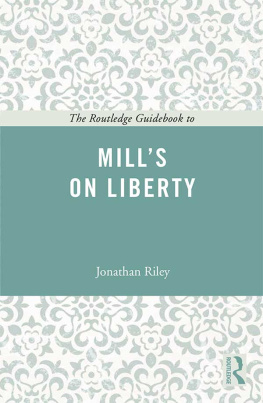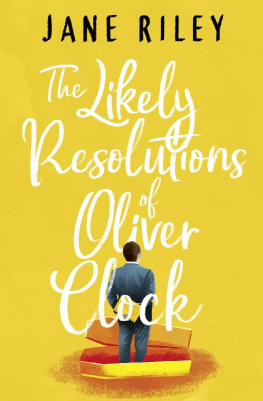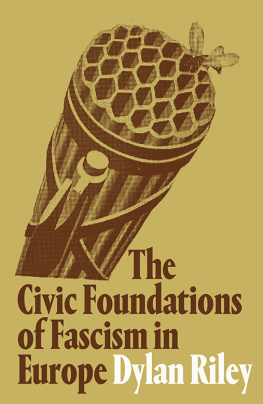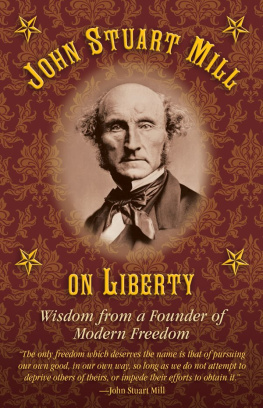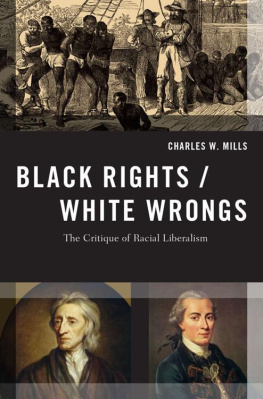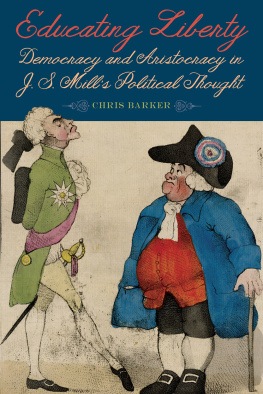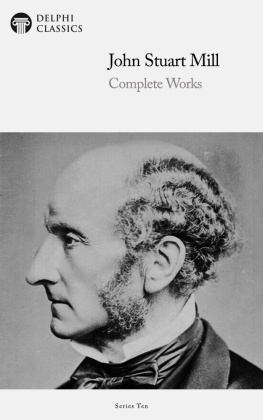Routledge Guides to the Great Books
The Routledge Guidebook to Mills On Liberty
John Stuart Mills On Liberty is widely regarded as one of the most influential and stirring pieces of political philosophy ever written. Ever relevant in our increasingly surveillance-dominated culture, the essay argues strongly in favour of the moral rights of individuality, including rights of privacy and of freedom of expression. The Routledge Guidebook to Mills On Liberty introduces the major themes in Mills great book and aids the reader in understanding this key work, covering:
the context of Mills work and the background to his writing
each separate part of the text in relation to its goals, meanings and impact
the reception the book received when first published
the relevance of Mills work to modern philosophy.
With further reading included at the end of each chapter, this is an essential guidebook for all students of philosophy and political theory, and all those wishing to get to grips with this classic work.
Jonathan Riley is Professor of Philosophy at the Murphy Institute, Tulane University, USA.
THE ROUTLEDGE GUIDES TO THE GREAT BOOKS
Series Editor: Anthony Gottlieb
The Routledge Guides to the Great Books provide ideal introductions to the work of the most brilliant thinkers of all time, from Aristotle to Marx and Newton to Wollstonecraft. At the core of each Guidebook is a detailed examination of the central ideas and arguments expounded in the great book. This is bookended by an opening discussion of the context within which the work was written and a closing look at the lasting significance of the text. The Routledge Guides to the Great Books therefore provide students everywhere with complete introductions to the most important, influential and innovative books of all time.
Available:
Gramscis Prison Notebooks John Schwarzmantel
Thoreaus Civil Disobedience Bob Pepperman Taylor
DescartesMeditations Gary Hatfield
HobbesLeviathan Glen Newey
Galileos Dialogue Maurice A. Finocchiaro
Wittgensteins Philosophical Investigations Marie McGinn
Aristotles Nicomachean Ethics Gerard J. Hughes
Heideggers Being and Time Stephen Mulhall
Hegels Phenomenology of Spirit Robert Stern
Lockes Essay Concerning Human Understanding E. J. Lowe
Platos Republic Nickolas Pappas
Wollstonecrafts A Vindication of the Rights of Woman Sandrine Bergs
Forthcoming:
De Beauvoirs The Second Sex Nancy Bauer
Paines Rights of Man Frances Chiu
AquinasSumma Theologiae Jason Eberl
Kierkegaards Fear and Trembling John A. Lippett
Machiavellis The Prince John Scott
Gibbons History of the Decline and Fall of the Roman Empire David Womersley
Foucaults History of Sexuality Chloe Taylor
Fanons Wretched of the Earth Jean Khalfa
JacobsDeath and Life of Great American Cities Peter Laurence
Webers Protestant Ethic and the Spirit of Capitalism David Chalcraft
Augustines Confessions Catherine Conybeare
Routledge Guides to the Great Books
The Routledge Guidebook to Mills On Liberty
Jonathan Riley

First published as Routledge Philosophy Guidebook to Mill on Liberty, 1998
This edition published as The Routledge Guidebook to Mills On Liberty, 2015 by Routledge
2 Park Square, Milton Park, Abingdon, Oxon OX14 4RN
Simultaneously published in the USA and Canada by Routledge
711 Third Avenue, New York, NY 10017
Routledge is an imprint of the Taylor & Francis Group, an informa business
1998, 2015 Jonathan Riley
The right of Jonathan Riley to be identified as the author of this work has been asserted by him in accordance with sections 77 and 78 of the Copyright, Designs and Patents Act 1988.
All rights reserved. No part of this book may be reprinted or reproduced or utilised in any form or by any electronic, mechanical, or other means, now known or hereafter invented, including photocopying and recording, or in any information storage or retrieval system, without permission in writing from the publishers.
Trademark notice: Product or corporate names may be trademarks or registered trademarks, and are used only for identification and explanation without intent to infringe.
British Library Cataloguing in Publication Data
A catalogue record for this book is available from the British Library
Library of Congress Cataloging in Publication Data
Riley, Jonathan, 1955
The Routledge guidebook to Mills On liberty / Jonathan Riley.
pages cm. -- (The Routledge guides to the great books)
Includes bibliographical references and index.
1. Mill, John Stuart, 1806-1873. On liberty. 2. Liberty. I. Title.
JC585.M63R55 2015
323.44--dc23
2015001817
ISBN: 978-0-415-66539-1 (hbk)
ISBN: 978-0-415-66540-7 (pbk)
ISBN: 978-1-315-72858-2 (ebk)
In memory of Patrick Sutherland Fallis (19481981)
le feu follet
The past is a foreign country, wrote a British novelist, L. P. Hartley: they do things differently there.
The greatest books in the canon of the humanities and sciences can be foreign territory, too. This series of guidebooks is a set of excursions written by expert guides who know how to make such places become more familiar.
All the books covered in this series, however long ago they were written, have much to say to us now, or help to explain the ways in which we have come to think about the world. Each volume is designed not only to describe a set of ideas, and how they developed, but also to evaluate them. This requires what one might call a bifocal approach. To engage fully with an author, one has to pretend that he or she is speaking to us; but to understand a texts meaning, it is often necessary to remember its original audience, too. It is all too easy to mistake the intentions of an old argument by treating it as a contemporary one.
The Routledge Guides to the Great Books are aimed at students in the broadest sense, not only those engaged in formal study. The intended audience of the series is all those who want to understand the books that have had the largest effects.
AJG
October 2012
Mills classic essay on individual liberty is the focus of a large literature. Surely there is nothing new to say about it, some (perhaps most) will think. Anyway, aside from his grand rhetoric, what is the interest for students of philosophy? Isnt his argument pretty straightforward, at least to the extent that we can make sense of it? Importance of moral rights, respect for rule of law and all that. Who needs a Guidebook to such ho-hum liberalism?
But a new guide to On Liberty is very much needed, I shall insist. Mills radical argument has largely been obscured by commentators, where it has not been dismissed as incoherent. His doctrine is not now, and has never been, what most people understand by that ambiguous term liberalism. In its place, much more conventional liberalisms continue to predominate in the philosophical literature. Today, students are likely to be misdirected toward one of these tamer alternatives, or worse, in the name of Millian liberalism.

